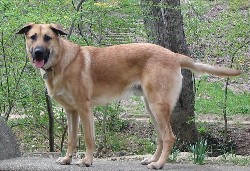The Chinook is an American breed, and the state dog of New Hampshire. They were originally created to pull sleds with a team of other dogs. These are hard-working dogs with plenty of endurance and power, along with the versatility to handle all sorts of jobs and tasks asked of them. Loyal, affectionate and playful, yet possessing a gentle nature, they make fantastic companions to boot! The breed is healthy and tends to live from 12-15 years. When health issues do crop up, the most likely issues are hip dysplasia, seizures and eye disease.
Chinooks are intelligent and easy to train. They are also more reliable off-lead than other sled dogs, although still must be trained to follow commands off-lead. Like all strong dogs with a propensity to pull, however, obedience training is a necessity. Perhaps surprisingly, they are fairly sensitive and do best with lots of positive reinforcement. Once trained, this large breed excels not only in obedience, but also in venues such as carting, agility, herding, and of course sledding. Some even go on to participate in therapy work or search and rescue!
When in the house, the Chinook is fairly laid-back as long as he gets enough exercise (both physical and mental). As might be imagined of a sled dog, this breed has a lot of energy that must be channeled into appropriate venues. He also must have an ongoing job to do so he doesn’t become bored. Jogging, backpacking, skijoring, camping and hiking are great examples of activities that will help fulfill a Chinook both mentally as well as physically. Of course, he’d also make a great sledding dog… if not for the decided lack of snow in Texas. Suffice it to say a half-hearted walk down the street probably won’t be enough.
Many Chinooks are friendly and outgoing to strangers, although aren’t inclined toward insanely-hyper friendliness. They are often polite and reserved until they get to know the person, and then quick to become friendly after that point. Some can be shy if not socialized early. Their general fondness for people means that they make poor watchdogs and very poor guard dogs. They also get along very well with children, other dogs and family pets including cats and livestock, particularly when socialized to these things from an early age. Some intact males don’t get along with other intact males, but this can sometimes be curtailed with… yet again, early socialization. Socialization is key to make sure they will be able to handle new people and animals with ease.
While not known for being a loud or “barky” breed, many Chinooks are vocal, whiney and talkative, and enjoy voicing their opinions. They can and do howl when excited, but this is normally only in short bursts. While a content Chinook with his needs met isn’t normally too loud, one that is left alone for long periods of time could turn into a problem barker – this breed can suffer from separation anxiety. Their great need to be around people means they make poor companions for those that work all day, and many owners of Chinooks find they need to take their dog with them to work.
While Chinooks are an official AKC breed, they are one of the rarest in the kennel club. As such, a person who is looking to own one might need to wait a bit in order to get the puppy of their dreams (be prepared to wait 6 months to 2 years). This wait might be even longer if they have their heart set on a particular ear set. Chinooks come with three different types of ear sets: down, prick or helicopter (flying out to the sides), although they won’t settle into their permanent position until after they have finished teething!
Although the Chinook has an easy-to-care-for short coat, he does shed heavily twice a year. In all other times of the year, he will shed minimally but fairly constantly. The double coat requires regular brushing and infrequent bathing in order to stay clean and healthy, and to keep shedding to a minimum. In addition to coat care, Chinooks need regular nail trims and tooth care.
Chinooks are hard-wired diggers and many owners have a hard time training this trait away. They don’t normally dig to escape but rather to create craters to lay in throughout the yard. This is but one of many reasons why the breed should never live outside – the biggest being that they are far too social for an isolated, outside life. Chinooks are able to live in apartments as long as they get tons of exercise daily, but a house with a yard is the ideal situation for both owner and dog. Many breeders prefer that the owner has a fenced yard, and discourage electronic fences because the Chinook’s high pain tolerance means he might just run right through it.

Photo https://commons.wikimedia.org/w/index.php?curid=1491374
